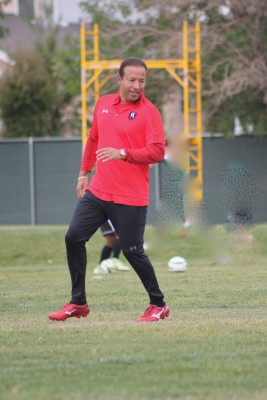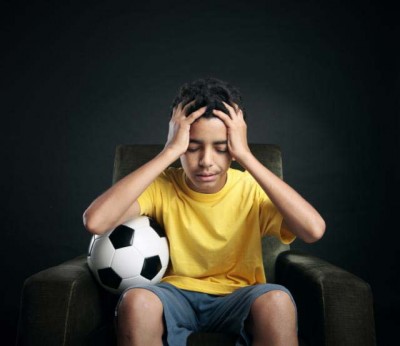Now that you've reached your goal, you need to work twice as hard to keep it

Zuriel Lozano
International goalkeeper coach, Masters degree in Sports & health science. Certified by the National Academy of Sports Medicine.
Speaker-Blogger-Mental Coach
Why college student athletes quit before they graduate?
A large number of soccer players, quit college athletics before their senior year. 30% of college athletes will quit their sports before they graduate, among those an alarming number of soccer players. Are you surprised?
This blog will give you a REALITY CHECK about potential problems you could face. Let’s explore only few reasons why they’re quitting:
Reason 1:
Dangerously doing too much
Some of these goalkeepers or field players have been playing soccer from the ages of 5-9 yrs old. Many of these kids were placed in competitive, traveling or regular teams at young age and played for YEARS, for example:
- League weekend games,
- Tournaments (4 to 5 games in 3 days)
- Showcases
- ID camps
- Team additional trainings.
- Some athletes played later in competitive teams but had the same brutal pace in a shorter period of time. They simply NEVER STOPPED and NEVER PROPERLY RESTED.
Being under a structurelized environment such as youth clubs practices VS playing a sports for fun or freedom away from structured environments makes a difference for the rest of your soccer career.
For those athletes who want to continue their soccer careers, playing in college would be a natural progression.
However, here it comes college recruitment process which is a very tedious & exhausting process for many people today, it is an entire different stress level.
You just got accepted into college now what?
Once they’ve been accepted into a college or university, many athletes tend to think they’ve reached their goal and now they can relax a bit.
However, the start of a college preseason has been a wake up call for many young athletes. Between, 5am team practices, fitness tests, long runs, road trips, gym workouts, team meetings and 2-3 a day practices, preseason will be a brutal wake up call and a true psychological test.
The fact is that making a college team is the easy part. However, staying competitive for the next 4 yrs is another story.
Furthermore, PRESEASON is one thing. But regular season has a complete different set of problems that we can discuss later.
Reason 2:
Expecting the “royal treatment”
This is huge!!!..So many college coaches around the country DO NOT care if you played for DA, ECNL, ODP or any “top level youth club team”.
Many goalkeepers or field players come to college thinking they will get the “royalty” treatment, at least that’s the feeling they received when they were initially recruited. But these feelings disappear within the first few weeks or during the first season.
In fact, many head coaches will never even speak to his players unless is about team tactics & pre/post game instructions; some of them do not even speak to the team after games, specially if you lose a game. They normally let their assistant coaches do the communication part.
Most Head coaches only care about an athlete’s GREAT PERFORMANCE. If you do NOT perform well in college, then you will be considered useless & in many cases athletes get dropped from the team the following season.
Can’t keep up with the college competitive pace & training.
Every year coaches recruit new goalkeepers or players which means your spot in the team is NEVER SAVE. In fact, every season you will be competing for a starting spots to ensure you can stay in the team. If you are not giving 100% at all times during & OFF season then you will be replaced almost immediately.
Teammates are also a HUGE factor why some athletes quit. If you have teammates who care about team first & self second, then you will have a great time working with them. But if you have those teammates who only care about self, or teammates who are simply MISERABLE, then you are stuck with them for a long time.
Some athletes simply cannot handle it, specially the ones who came from youth soccer clubs where they were the “SUPERSTARS” and always played for top teams.
However, once they go to college they realize they are no longer getting the attention they once received at a youth club. Therefore, they suffer in college for few seasons before they realized they are not happy anymore.
Reason 3:
Your social world is important.
If you are a college athlete, then your sport & school is your full-time job. However, if you are a social butterfly who cares more about chasing girls or boys, party, drinking, going out on the weekends, spending your free times with friends etc, then prepare yourself to come to a complete CULTURAL SHOCK. Your social life will be completely different as a student athlete.
In other words, if your desire to go-out, party and being sociable is more important than your full-time college sport & academics then the next 4 yrs in college will be the most miserables yrs of your life.
Reason 4:
Choosing the wrong school
There is an incredible amount of kids who are LASER-FOCUSED on playing for a division I Universities. Some of them just love the title “division I player”, others just want to play in college.
Some athletes make decisions out of desperation because they see their teammates already getting accepted into colleges, or they hear youth club coaches say that “colleges are recruiting early”. At this point, they feel NO schools is calling them so they end up just accepting ANY offer from ANY Division I school.
Historically these deseparte or impulsive decision will turn out to be a terrible mistake.
However, this is not just Division I, this is at any level or school. The point is that the wrong selection in schools could be a true nightmare.
Reason 5:
Academics
There is not much to say here. You go to college to get a degree, if you do not study then you will fail school. However, as a student athlete, you must keep up with your athletic responsibility, as well as academically to be able to stay in the team. Some kids simply cannot do both!!!
Reason 6:
Injuries.
Injuries is part of being an athlete and it can happen to anyone. However, a number of kids come to college after playing for MANY YEARS with NO to LITTLE RESTING periods. As result, athletes are at HIGHER risks to get frequent nagging injuries.
Furthermore, some athletes will go as far as FAKING injuries just to rest a bit longer or they simply do not want to face the hassles of training and athletic life.
Other injuries are considered career ending-injuries where nothing more can be done. Therefore, you are no longer useful or needed in a team.
Few things you can do:
I get so many emails from college athletes around the United States who love being part of college athletics.
However, I also get more emails from those who are struggling and those who simply quit playing on their second year. Many kids think that once they get accepted into a college then they can relax. However, this is when the REAL WORK begins.
If you are a goalkeeper or field player looking to play in college, understand that college is no longer a youth club environment. College coaches have to KEEP THEIR JOB so winning is the only reason why they still have their jobs.
As result, they will demand a lot from you as an athlete. If you want to play in college for popularity, bragging rights or because you parents want you to, then you will NOT MAKE IT FAR. Find a legitimate reason for playing in college.
Take your time when making a decision
Do not feel obligated to accept the first school that comes your way. Keep searching for a school or division that will FIT YOUR NEEDS.
Some times college offers do not come soon enough and this gives you the idea that you have to make a decision right away, so do not make a college decision under duress or stress because this will turn into a real headache in your college career.
DO NOT go into a college preseason out of shape, slow and injured.
You must have a rigorous off-season training before arriving to your college season. You will be going through intense preseason & regular season training for the next 4 years so get used to working at this pace.
Final thought
This blog was written after hundreds of emails and messages flooded my box from kids who spent their entire youth club careers thinking of playing at the college level.
However, once they arrived at their college they realized, there WERE NOT READY. This is where THE REAL WORK BEGINS and it is much harder than what they thought. We want to keep all of our reader aware of these types of situations.
We also know so many college coaches who are GREAT PEOPLE and outstanding coaches who genuinely care about their athletes.
Furthermore, we also know thousands of college athletes who truly enjoyed their athletic career in college. This is why our blogs are direct & truthful about things that happens to athletes today.
Now is up to you to explore, search and analyze your personal situation and make a realistic decision about your next 4 years in college.
More to explorer
Soccer parents, are you exhausted?
You seem to be living your life according to youth club soccer. An intense emotional roller coaster is experienced by parents throughout the United States as their children progress through their youth soccer careers. You may not think so, but being a youth soccer parent is exhausting emotionally and physically. Many parents have developed serious
Who stresses more during games parents or athletes?
Nervous soccer parents

Understanding Athlete Burnout
Athlete burnout is defined by Sport Psychologists as: physical/emotional exhaustion, sport devaluation, reduced athletic performance and accomplishment”. Burnout can happen at a very young age. I have personally met many 12-year-olds who show severe signs of burnout. Unfortunately, a number of parents refuse to believe their children are too young to burn out, insisting that what their children require is